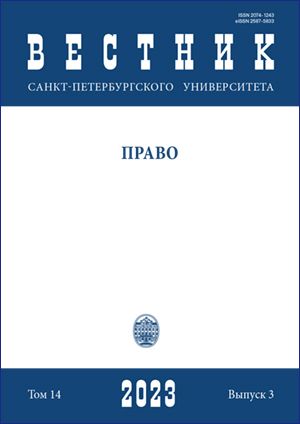Exemption from criminal liability with the appointment of a court fine: Application trends and development prospects
DOI:
https://doi.org/10.21638/spbu14.2023.304Abstract
The article analyzes statistical data reflecting the trends in the implementation of exemption from criminal liability with the appointment of a judicial fine. It has been established that the legislative expansion in 2016 of the exempting norms was reflected not in the level of their application, but in the structure. The crisis phenomena in the economy that emerged in 2020, provoked by COVID-19 restrictions, slowed down the growth in the application of Art. 76.2 of the Criminal Code of the Russian Federation, achieved by reducing the level of implementation of Art. 76 of the Criminal Code of the Russian Federation. Expansion Art. 76.2 of the Criminal Code of the Russian Federation contributed to the broad interpretation of the terms of application by the Ruling of the Presidium of the Supreme Court of the Russian Federation. By allowing any actions of the perpetrator to be classified as compensatory, provided that they are legal and do not infringe on the rights of third parties, the Supreme Court of the Russian Federation laid the foundation for the “reassessment” of the actual circumstances from active repentance or reconciliation with the victim to compensation for damage and allowed the extension of exempting norms to persons who have committed acts that harm the public interest. Sharing the desire of the legislator to reduce the repressiveness of the criminal law, it is necessary to keep the institution of exemption from criminal liability of an exceptional nature by limiting the possibility of its application in relation to criminal acts that pose a threat to national security. The results of the study give reason to doubt the expediency of further regulatory expansion of the institution under consideration. The best option for reducing the share of crime is reasonable criminalization and adequate penalization of socially dangerous acts.
Keywords:
exemption from criminal liability, judicial fine, make amends, structure, dynamics, national security, penalization
Downloads
References
Downloads
Published
How to Cite
Issue
Section
License
Articles of "Vestnik of Saint Petersburg University. Law" are open access distributed under the terms of the License Agreement with Saint Petersburg State University, which permits to the authors unrestricted distribution and self-archiving free of charge.






